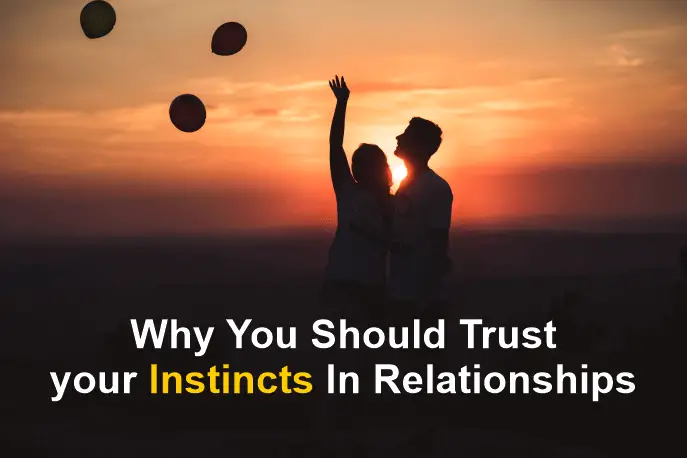As an inbuilt alert system that helps humans watch out for and avoid dangers, you must trust your instincts in relationships.
If instinct is important for our overall existence and preservation, it should not be ignored in human relationships where individuals draw happiness and emotional energy.
Just like intuition, which is a higher perception than instincts, having the full application of instincts can make one feel like a psychic – of course, humans are.
But because our everyday lives are made simple by instincts and intuition, we seldom take cognizance of how instinctive and intuitive we should be in our relationships.
This article is going to focus on why you should trust your instincts in relationships.
See a comprehensive article on basic instincts.
Importance of instincts in relationships

While instinct must be triggered, how we respond to it is the most important.
Almost everyone responds to relationship instincts in the same specific way. This is because instinct is rigid and inflexible and does not improve, no matter how often it’s triggered.
For instance, everyone reacts to heartbreak with a sunken mind, depression, and other negative emotions that are capable of causing more harm.
Though your response to it might be prompted by reflex, with training, you will be able to control how you respond to relationship issues, instead of whatever your instincts present.
Most relationships are marred by distrust and a lack of respect for partners.
This alone is enough to make one hyper-instinctive and always on the lookout for signs of danger and how to protect oneself, not only from physical assault but also emotionally.
Importance of instinct in relationships
- Makes you on alert
- Makes you not be taken unawares by your partner’s behaviour
- Helps you to develop alternatives ahead of time
- It requires a ‘yes’ or ‘no’ answer, and you must provide it for clarity
Related Posts
- Clear difference between intuition and instincts
- Different Ways Instincts Keep You Alive
- Why You Cringe When Others Embarrass Themselves
- Addressing Doubt and Insecurity in Relationships Through Gut Feelings
- Why You Are Being Exploited in A Romantic Relationship
- Applying Primal Instincts in Modern Society
- How Instincts Drive Desire For Status
- Breaking Free: The Power of Independent Thinking
Applying instinct in your relationship
Instinct is only developed within your being by living naturally and minimizing unnecessary modern life.
The closer you are to nature, the more instinctive you are, since instinct is hardwired in our system to recognize and move away from danger.
People who expect little from their partners are never taken unawares by any unhealthy surprises they might pull.
This is because they have instinctively fortified their life against the anxiety that accompanies such behaviours.
Instinct is the doorway to intuition. You cannot be intuitive without first being instinctive.
You have to answer the questions straightforwardly, your response to instinct is yearning for.
- Can I put up with this her/his attitude?
- Is this person the right person for me?
- What if he/she sees another person better than me?
- Should I leave the relationship now?
These questions are triggered by your instinct and you must answer them to determine how you act.
If your answer is a ‘no’, you will notice physiological signs immediately.
Your instinct will give an obvious sign when triggered. Here are some signs you will notice:
- Goosebumps
- An uncurling feeling in your gut
- A knotting feeling in your chest
- Sweating even when the weather is cold
- Fast heartbeat
- A hard swallow
These are negative signs that should trigger a fight or flight response; therefore, informing you there is a danger in the relationship and you should tread carefully.
However, if you give a positive answer, you will notice positive signs, including:
- Elevated mood
- Unconscious smile
- Shaking your foot
- The desire to mate
And another instinctive body language that indicates happiness and a good mood.
3 ways to trust your instincts in relationships

Most people in romantic relationships are sometimes not happy. They are insecure, walk on eggshells, and are not sure what decision to take.
Their instincts get triggered now and then, they know something is not right, and when they try to talk to their partner, they are either dismissed or the tables are turned against them.
They are labeled as overly sensitive instead of addressing their concern, and when this goes on for a while without resolution, it can degenerate into something harmful.
1. Don’t ignore your emotions
Emotions are manifestations of the state of the mind and can serve as instincts when one has a strong relationship with oneself and feelings.
For instance, worry is an emotional and instinctive way to respond to bad treatment.
Worry won’t go away unless the underlying cause is removed. Usually, the partner’s behaviour triggers this feeling.
If your partner does not help you worry, then it’s time to take action that would guarantee your happiness.
2. Unreliability triggers your instincts in relationships
An unreliable partner always keeps your instincts on hyper-alert. One of the reasons for love and romance is companionship, which thrives on honesty, reliability, and peace.
If people don’t do what they say they will do, they are not reliable and this can trigger instincts to make a person want to take flight in a relationship.
This is a major problem if they are constantly unreliable on important things that have a direct effect on you.
3. Don’t take your insecurity for granted in your relationship
If you are feeling more insecure than you feel confident in your relationship, then you should be worried. That’s your instinct connecting intuition and passing a message.
If this is recurring, with your partner not helping the situation, it’s a problem.
You are not to blame when you feel insecure, as triggered by your instincts. Talk to your partner about your worries and see their response.
In most cases, you might be tired of booking a talk session on the matter with your partner because they don’t seem to care about your worries.
If it’s something you can live with, that’s fine, but if you can’t bear the vibes you are getting, then it’s time to change strategy.
Frequently Asked Questions
How can I trust my instincts in a relationship?
Pay attention to your feelings, communicate openly, observe patterns, and seek feedback from trusted friends or family members.
Can instincts be wrong in a relationship?
Instincts can be influenced by past experiences and biases, so it’s important to balance them with rational thinking and communication.
How do I differentiate between fear and instinct in a relationship?
Fear often feels anxious and irrational, while instinct feels more like a calm, inner knowing based on subtle cues.
Can intuition help in making relationship decisions?
Yes, intuition can provide valuable insights, but it’s important to combine it with rational thinking and open communication for balanced decisions.
Conclusion
You should trust your instincts in a relationship because it is more accurate than they are not.
It gives you hints that you can investigate further to have a grip on the situation.
To sharpen your instincts, you should gravitate more towards nature and have a receptive mind.
SOURCES:
- Mating instincts
- https://www.marriage.com/advice/relationship/gut-instinct-in-relationships/
- https://doctor-diane.com/trusting-your-gut-in-dating/
Pious Clements is the insightful voice behind "The Conducts of Life" blog, where he writes about life ethics, self-development, life mastery, and the dynamics of people and society.
With a profound understanding of human behaviuor and societal dynamics, Pious offers thought-provoking perspectives on ethical living and personal growth.
Through engaging narratives and astute observations, he inspires readers to navigate life's complexities with wisdom and integrity, encouraging a deeper understanding of the human experience and our place within society.
